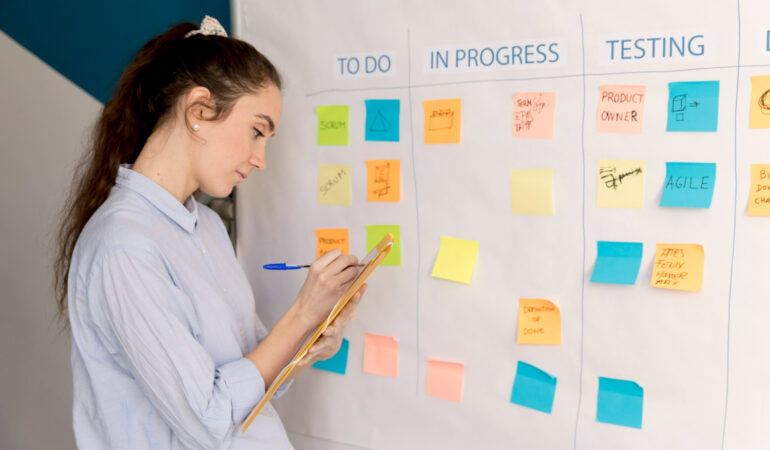Empowering Agile Teams: The Art of Agile Team Facilitation
High-performing teams are at the heart of successful project delivery in the Agile environment. As an Agile Team Facilitator, your role is crucial in creating an environment that fosters collaboration, innovation, and continuous improvement. In this blog, we will explore the art of Agile Team Facilitation and how it can transform a group of individuals into a cohesive and self-organizing Agile team.
The Role of an Agile Team Facilitator:
To start off, we’ll delve into the key responsibilities and characteristics of an Agile Team Facilitator. From guiding Agile ceremonies to removing impediments, an effective facilitator serves as a catalyst for team success.
Creating a Safe and Collaborative Space:
The creation of a secure and inclusive environment in which team members feel comfortable sharing their ideas, concerns, and criticism is a vital part of Agile Team Facilitation. We’ll look at different facilitation strategies for encouraging open communication and a culture of trust among the team.
Facilitating Agile Ceremonies with Finesse:
Agile ceremonies are essential for team alignment and progress tracking. We’ll discuss how an Agile Team Facilitator can lead ceremonies such as Sprint Planning, Daily Standups, Sprint Reviews, and Retrospectives with finesse, ensuring maximum value and engagement from all participants.
Effective Decision-Making Techniques:
Agile teams often encounter decision points throughout their projects. Understanding and employing various decision-making techniques, such as Consensus Building, Fist of Five, or Dot Voting, can significantly enhance the team’s ability to make informed and collective choices.
Managing Conflict and Resolving Issues:
Conflict is natural in any team setting, but if left unaddressed, it can hinder productivity and collaboration. Learn how Agile Team Facilitators can identify and address conflicts constructively, promoting a positive team dynamic and creating opportunities for growth.
Coaching and Mentoring for Growth:
Beyond facilitating ceremonies, Agile Team Facilitators can also act as coaches and mentors to team members. We’ll explore coaching techniques that empower individuals to take ownership of their roles, grow their skills, and embrace the Agile mindset.
The Impact of Agile Team Facilitation on Project Success:
Drawing on real-world examples, we’ll showcase the positive impact of effective Agile Team Facilitation on project outcomes. From accelerated delivery to improved team morale, the value of a skilled facilitator is undeniable.
Continuous Improvement and Adaptability:
Agile Team Facilitation is not a one-size-fits-all approach. In this section, we’ll emphasize the importance of continuous improvement and adaptability as facilitators evolve their practices to suit the unique needs of their teams and projects.
Agile Team Facilitation is an art that requires a blend of soft skills, agile expertise, and a genuine passion for empowering teams. As you embark on your journey as an Agile Team Facilitator, remember that your influence extends beyond just guiding ceremonies; you have the power to shape the team’s culture, nurture collaboration, and pave the way for extraordinary project success. So, let’s embrace the art of Agile Team Facilitation and unlock the full potential of our Agile teams!
Popular Tags
ICP ATF Agile Facilitation Certification, ICP ATF Certification UK, Agile Team Facilitation UK, ICP ATF Coaching UK










